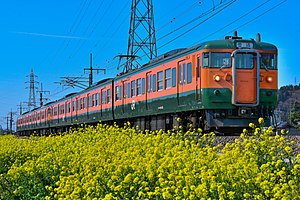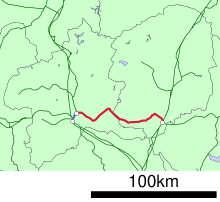Ryōmō Line
This article needs additional citations for verification. (December 2009) |
| Ryōmō Line | |||
|---|---|---|---|
 A JR East 115 series EMU at Ōhirashita in March 2016 | |||
| Overview | |||
| Locale | Gunma, Tochigi prefectures | ||
| Termini | |||
| Stations | 18 | ||
| Service | |||
| Operator(s) | JR East | ||
| History | |||
| Opened | 1889 | ||
| Technical | |||
| Line length | 84.4 km (52.4 mi) | ||
| Track gauge | 1,067 mm (3 ft 6 in) | ||
| Electrification | 1,500 V DC overhead catenary | ||
| Operating speed | 95 km/h (60 mph) | ||
| |||
The Ryōmō Line (両毛線, Ryōmō-sen) is a Japanese railway line connecting Oyama in Tochigi Prefecture with Maebashi in Gunma Prefecture. 84.4 km (52.4 mi) long, the line is owned and operated by the East Japan Railway Company (JR East). The name refers to the fact that Gunma and Tochigi prefectures were once part of an ancient province called Keno (毛野), which was later split into Kōzuke (Gunma) and Shimotsuke (Tochigi). This line connects both halves of the old province.
Services
Most Ryōmō Line services continue beyond Shin-Maebashi and terminate at Takasaki on the Joetsu Line. Local trains run about once in an hour during the day between Oyama and Maebashi and twice or three times as frequently between Maebashi and Takasaki. Some rapid services from Ueno and the Shōnan-Shinjuku Line travel through onto the Ryōmō Line, but they stop at every station.
Akagi limited express services travel to Maebashi from Ueno (four times daily to Maebashi, two or three times daily to Ueno) or Shinjuku (one round trip daily). On the weekdays some Akagi services are branded Swallow Akagi.
Station list
- ^ The official start of the Tobu Utsunomiya Line is at Shin-Tochigi, but all trains travel through on the Tōbu Nikkō Line to Tochigi.
- ^ The official start of the Agatsuma Line is at Shibukawa, but all trains travel through on the Joetsu Line to Takasaki.
- ^ The official start of the Hachiko Line is at Kuragano, but all trains travel through on the Takasaki Line to Takasaki.
Rolling stock
The following train types are used on the Ryōmō Line.
- 107 series (until October 2017)
- 115 series (now only 115-1000 series)
- 185 series (Akagi limited express services)
- 211 series
- 651 series (Akagi limited express services)
- E231-1000 series
- E233-3000 series EMUs (since 1 September 2012)[1]
History
The Oyama to Kiryu section was opened in 1888 by the Ryomo Railway, and extended to Shin-Maebashi the following year. The company merged with the Nippon Railway in 1897, and that company was nationalised in 1906.
References
This article incorporates material from the corresponding article in the Japanese Wikipedia.
- ^ JR東日本 高崎線・両毛線 E233系3000番代営業運転開始 [JR East E233-3000 series enter revenue service on Takasaki and Ryomo Lines]. Tetsudō Daiya Jōhō Magazine. Vol. 41, no. 343. Japan: Kōtsū Shimbun. November 2012. p. 78.
External links
- Stations of the Ryōmō Line (JR East) Template:Ja icon

